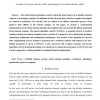Free Online Productivity Tools
i2Speak
i2Symbol
i2OCR
iTex2Img
iWeb2Print
iWeb2Shot
i2Type
iPdf2Split
iPdf2Merge
i2Bopomofo
i2Arabic
i2Style
i2Image
i2PDF
iLatex2Rtf
Sci2ools
118
click to vote
TEC
2002
2002
Learning and optimization using the clonal selection principle
The clonal selection principle is used to explain the basic features of an adaptive immune response to an antigenic stimulus. It establishes the idea that only those cells that recognize the antigens are selected to proliferate. The selected cells are subject to an affinity maturation process, which improves their affinity to the selective antigens. In this paper, we propose a computational implementation of the clonal selection principle that explicitly takes into account the affinity maturation of the immune response. The general algorithm, named CLONALG, is primarily derived to perform machine-learning and pattern recognition tasks, and then it is adapted to solve optimization problems, emphasizing multimodal and combinatorial optimization. Two versions of the algorithm are derived, their computational cost per iteration is presented and a sensitivity analysis with relation to the userdefined parameters is given. CLONALG is also contrasted with evolution strategies and genetic algor...
Related Content
| Added | 23 Dec 2010 |
| Updated | 23 Dec 2010 |
| Type | Journal |
| Year | 2002 |
| Where | TEC |
| Authors | Leandro Nunes de Castro, Fernando J. Von Zuben |
Comments (0)

